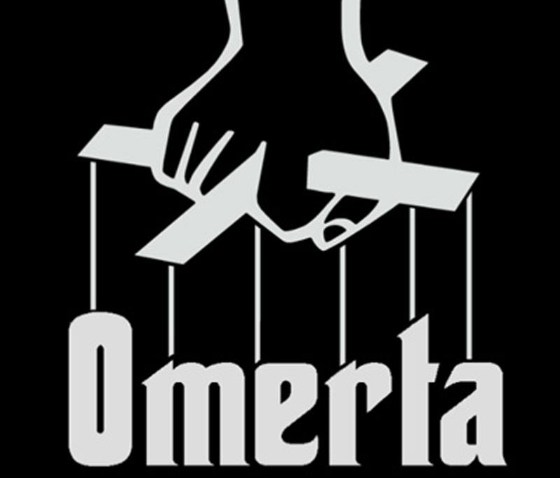The revelation of the Bundeswehr’s plan to cut off supplies and transportation to two million Crimeans has outraged the German political class and the media, not the horrific act of terror against an important bridge for innocent citizens itself.
80 Years later, Germany wants to attack Russia again!
One of Germany’s top military brass discussed attacks with German weapons on targets in Russia with other senior officers. This despite the fact that Germany is not at war with Russia, at least not officially. As it was a telephone conversation over a WebEx line, easily to be compromised given the ubiquity of intelligence hacking, and cyber issues, one would have expected the German military would be more professional and careful.

Here is a short audio excerpt: “The [Crimean] bridge in the east is hard to hit, as that’s quite a narrow target, but the Taurus can do that, and it can also hit ammo depots,” Space Command officer Frostedt said. General Gerhartz, Bundeswehr Inspector echoed the latter’s suggestion, saying that “there is an opinion that the Taurus will handle that (hit the Crimean Bridge) if the French Dassault Rafale fighter jet is used.” You can find the complete audio recording here.
Yet Defense Minister Pistorius and other German government officials instantly accused Russia of having leaked and manipulated the conversation for propaganda purposes without producing the slightest shred of evidence.

It’s political theater as he would like to supply Taurus to Ukraine when he calls the leak a “Russian disinformation war”. How can it be Russian disinformation when even his government didn’t deny the phone call and confirmed the leak as authentic and real?

Perhaps the general, speaking to his colleagues in Germany from a hotel room in Singapore, was also being monitored by Singaporean intelligence, which is known for its exceptional professionalism, or Chinese intelligence, which is equally professional and would have forwarded the recorded conversation to Russia after being taken aback by what they heard. Alternatively, it might have been a Western intelligence agency that sought to humiliate Chancellor Scholz and exert pressure on him to finally give up his resistance to supplying these extremely destructive weapons to Ukraine.

The German government has launched an investigation into how this information came to light, not the information itself. And as we know from the investigation into the act of terrorism against the Nordstream energy pipeline, it is likely to be just another investigation in form. Both the Swedish and Danish investigations have been closed without any findings or results being made public. The German Nordstream investigation is still ongoing, but without any enthusiasm. The whole issue is being put on the back burner. The German government has stated that we are not in a position to discuss the Nordstream case any further because it is the subject of an investigation. So we have to wait until this investigation is completed and a report is available, and when the report comes, we will be told that the report is secret and cannot be discussed publicly, and the whole thing will take care of itself.
How the German media (dis-)informed about the explosive conversation of the generals
Within an hour of every claim made by Ukrainian President Zelensky against the Russians, whether true or false, German media publish it as news. It took 14 hours for German politicians and media to agree on a wording after Margarita Simonjan, the editor-in-chief of RT, published the report on the wiretapped conversation between the German air force generals about an attack on Russia. And when the media started reporting, German readers didn’t find out what it was actually about because the media distracted from the real issue.
We have encountered this before, so it is not brand-new. It takes some time for the German media to come to an informal consensus about how best to report news that discloses information that the German public is not supposed to know. Consequently, it should come as no surprise that at one point the German media only ran brief pieces in which they reported very little about the discussion’s content and, without exception, agreed that the communication had been intercepted by the malicious Russians.
The authenticity is not disputed… but the content is concealed
The Bild newspaper, Germany’s largest newspaper with around one million copies sold, ran the headline “Unbelievable Bundeswehr mishap – Russians eavesdrop on secret conversation between German generals” and instead of reporting comprehensively on the content of the conversation, the Bild editorial team was outraged that the Bundeswehr had allegedly been bugged.
As a consolation, Bild reports that the Bundeswehr enforced censorship measures “to limit the damage” by blocking X accounts in Germany that disseminated the recording. Censorship as damage limitation is something German elites like to use, for example when it comes to suppressing legitimate criticism of their genocidal ally Israel under the pretext of alleged anti-Semitism.
It is clear that the damage must be kept to a minimum. Since all other harm has already been done, the goal is to keep Germans from learning about the conversation’s contents: The explosive dialogue has been translated into other languages and is well-known globally. What the Bundeswehr leadership intends to do behind closed doors is therefore known to everyone except the Germans.
According to reports in all German media, the authenticity of the recording is undisputed. In fact, it is said that the Military Counterintelligence Service (MAD) is currently investigating how Russia was able to intercept the conversation because it is alleged that the Russians could have access to internal communication lines.
The haphazard assertion that the leak suggested the Russians might have access to the Bundeswehr and the German Ministry of Defense was meant only for the foolish press; after all, if the Russians really had that kind of access, they would most certainly not have taken the chance to publish a conversation they had overheard through the grapevine. Rather, as reported by Der Spiegel, for instance, the German generals were just being foolish because they were communicating with one another over the comparatively easy-to-eavesdrop WebEx platform, with one of the participants located in Singapore. As he was on the phone to Germany from the other side of the world, it would have been relatively easy to eavesdrop on him. As Der Spiegel writes,
“Given the explosive nature of the topics, an encrypted line should have been used in this case; Bundeswehr regulations are clear on such conversations about military internals.”
The fact that X (ex-Twitter) collaborated with the German government and enforced censorship of the Bundeswehr is bad enough. But much worse is that all the German media that have reported so far have revealed virtually nothing about the content of the conversation. And of course the conversation itself has not been linked to any article in the German mainstream media. This is all the more remarkable as it is a matter of life and death for the Germans, because if German forces attack Russia, it is likely that Russia will also attack Germany in retaliation, and then Germany would be caught up in the third (and probably last) world war that it started.
It also reveals another disturbing truth: the German media, which supports secrecy, is once again betraying the interests of its viewers and readers in the service of self-serving elites pursuing their own agendas.
More lying – by omission
The Spiegel article, for example, comprises twelve paragraphs, but the explosive content of the conversation is only dealt with in two paragraphs, where the Taurus mission is only briefly mentioned.
Der Spiegel keeps its readers in the dark about how the generals already feel queasy about programming since it would entail Germany getting directly involved in the conflict. They are trying to figure out a method to get around German involvement in the war, or at least hide it, in the discussion. General Frank Gräfe even states pretty plainly at one point during the conference call:
“Involved is involved”
Still, like with other German media, Spiegel readers are not made aware of this. They are unaware that the generals are talking about ways to hide Germany’s engagement in the conflict, like having the British do the dirty work of programming the missiles—something they are already doing quite openly for the deployment of their Storm Shadow cruise missiles—or putting the manufacturer in the middle of communications with Ukraine to hide the Bundeswehr’s involvement.
When Der Spiegel claims that the Crimean Bridge (also known as the “Kerch Bridge”) and weapons depots were “among other things,” it is lying to its readers. The Spiegel editorial team suggests that it was very vaguely about many possible targets, including ammunition depots and the Crimean Bridge.
That was wrong because the air force officers discussed in great detail how to target the ammunition stores and the Crimean Bridge. They discussed a nearly completed attack plan for the Crimean Bridge after carefully analyzing this. Their main challenge was explaining this plan to the Ukrainians, who had not received extensive training on the Taurus and could not program the missiles themselves.
Der Spiegel misled its audience by failing to disclose the topic of the talk or how delicate it actually was. However, this isn’t only the case for Spiegel readers; readers of all other mainstream German media are also being purposefully kept ignorant.
Diversionary tactics instead of reporting
This is why the articles in the German media distract from the actual topic of discussion. The Bild newspaper focuses on the interception of communications by the Russian government. Der Spiegel follows this example, but goes into great detail to emphasize that it was “Russian propaganda”. It was clear from the outset that Der Spiegel would base its article on these two narratives:
“Russian propaganda channels have published a recording of an internal meeting of air force officers. The recording is presumably authentic, and military intelligence has launched an investigation.”
Omertà — the systematic silencing of unpleasant truth (and crimes)
It’s evident that the German government, which acknowledged that the discussion between the German generals was genuine and authentic, has attempted to deflect criticism from the conversation’s actual content by asserting that it cannot determine whether the exchange was altered or whether unspoken things were added.
However, Berlin could easily have learned the truth if it had simply questioned these military personnel (which the authorities would have done anyway). It is almost certain that the German government would have informed us if there had been concrete evidence of any kind of manipulation of the recordings, especially if it had been done by Russia.
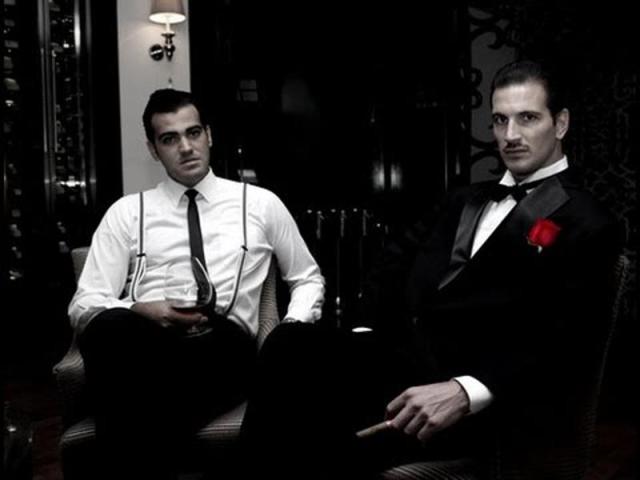
However, the Germans have embraced the customary Western approach of omerta, refusing to discuss such embarrassing material. And thus a wall of silence has descended. Western officials have found that whenever a scandal or disaster occurs, the best way to limit the damage and avoid taking responsibility is for everyone to keep quiet about it. To the extent that it is discussed at all, everyone in the political and governmental system—as well as the media establishment—needs to keep quiet and, if compelled to talk about it, adopt a denialist posture. Thus, whatever happened vanishes into a memory hole, allowing them to proceed to the next disaster and the next war.
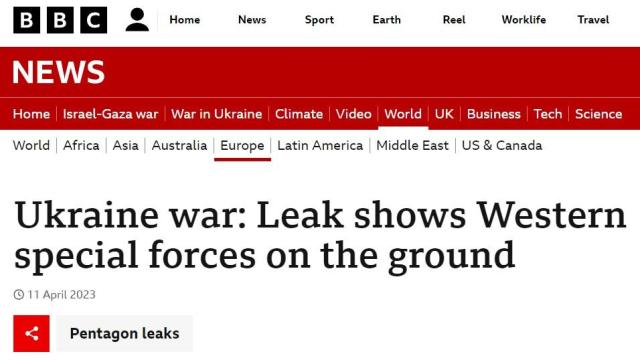
This explains why outsiders are so antagonized by the Western political elite and the media class (both of which are closely intertwined) when they enter the scene. Since these outsiders are not bound by the Omerta principle, giving them access to parliament, a larger platform and public contacts makes it much more difficult, if not impossible, to carry out such operations.
A gross attempt to silence opposition figures
This was the reason for the astonishing reaction in London when experienced politician and maverick George Galloway won the Rochdale election. It was noteworthy because he was the target of crude remarks. Rishi Sunak made a speech on the steps of 10 Downing Street, the likes of which are rarely given by a British Prime Minister, because Galloway’s victory was such an unpredictable and alarming occurrence. The Prime Minister warned luridly about supposed threats to public order and the danger from people (like Galloway) conducting protests, and that the police should take firm action.
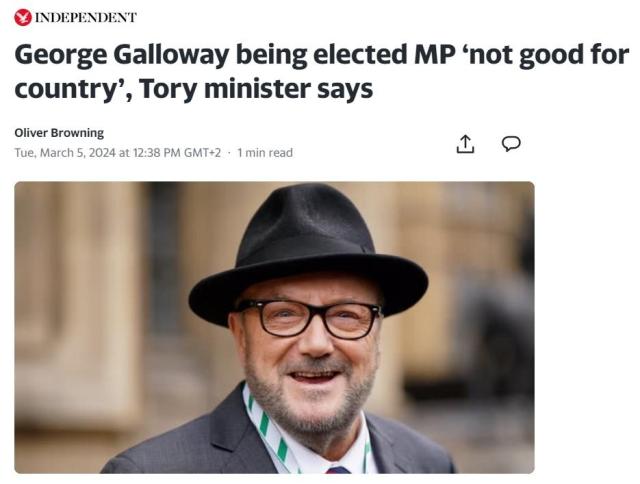
The U.S. and other Western nations are ostensibly at peace with Russia, but German NATO officers are discussing missile strikes on Russian territory. Russia is a nuclear state (with the world’s largest arsenal of nuclear bombs), a Cold War foe, a former and possibly future superpower. Western elites consider it inappropriate to publicly thematize the content of the German generals’ discussion. Instead, they demand to find out how the Russians obtained the recording and call for an investigation.
NATO tells its Ukrainian personnel who and what to shoot at
We are not supposed to know that the British and the Ukrainians are jointly firing Storm Shadow missiles against the Kerch Bridge, while the British are doing all the programming of these cruise missiles for the Ukrainians. The British and the Americans select the targets, program the missiles and the Ukrainians’ only task is to shoot down the missiles from the Sukhoi 24 fighter-bombers before the Russians detect and shoot them down.
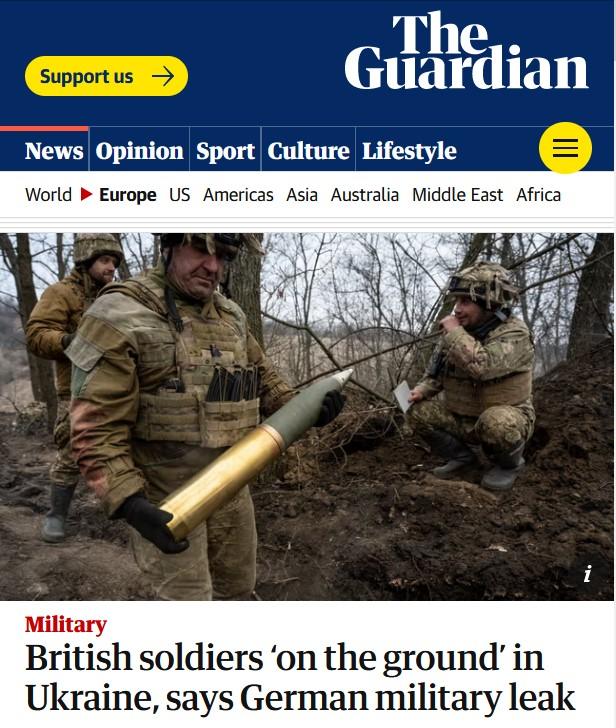
That smacks of full participation in the war. And what we shouldn’t know, but do know from these German military experts, is that it is very complicated and time-consuming to prepare Taurus missiles for these kinds of missions. Moreover, it is inconceivable to the Germans that the Ukrainians would be able to replicate all this. It would have to be done in Germany, by German military technicians, or they would have to send a large team to Ukraine, as the British have done. Something that wouldn’t even be legal for the Germans.
The generals spoke of a presentation that they had to prepare at the request of Defense Minister Pistorius and which, it seems, took place behind the back of Chancellor Scholz, who had repeatedly and publicly ruled out the delivery of Taurus to Ukraine. And as we know, Pistorius has positioned himself as the successor to Chancellor Scholz, who has become unpopular.
The political bureaucracy and the deep state have the final say
According to Glenn Diesen’s latest book “The Ukraine War & the Eurasian World Order“, President Barack Obama had serious doubts and concerns in 2014 about the wisdom of supplying arms to Ukraine. He issued a presidential directive forbidding this, but the entire administration disagreed with this directive, which was then circumvented, and weapons were delivered to Ukraine during Obama’s presidency in violation of his directive. Obama probably found out about this and looked the other way, which was not atypical for him. Something similar may have happened to Scholz, who says he made a decision, or at least claims he made a decision, that no Taurus missiles should be delivered to Ukraine, and that the bureaucracy and members of his own party, including the Minister of Defense, simply ignored him.

The conversation between the air force generals was published on the same day that Chancellor Scholz tried to reassure the public that neither Germany nor NATO would go to war with Russia. He was responding to French President Macron’s statement that he would not rule out sending troops to Ukraine to prevent a Russian victory and the Russian plan to end NATO’s Ukraine project. “I think the officers did what they were there for,” Pistorius said, backing his generals who apparently did the right thing, calling it a Russian information war. A meeting had been arranged with Pistorius, the officers said, adding that he “intended to carefully consider the issue of supplying Taurus missiles to Ukraine.”
Does it matter whether military or civilian targets are attacked?
“Because if we do there might be be an error in its use, the missile might hit a kindergarten, and there will be casualties again” these officers added, explaining that the delivery would take eight months and that this could not be shortened. The word “again” is crucial in this context because NATO is aware that Ukraine has hit civilians with rockets it has supplied, and the Crimean bridge has been attacked multiple times in the past, resulting in a significant number of civilian casualties.
Furthermore, during the German generals’ conversation, a very important question was raised: “Is our target the bridge or the military depots?”
The Germans, like the Ukrainians, the British, and the Americans, don’t appear to distinguish between military targets like ammo stores and civilian targets like the Crimean Bridge. “They have been intensely studying this issue” (of blowing up the bridge), they add. The officers regret that the bridge is too big and “may require more than 10, or even 20 missiles.”

They are discussing how this should be presented to the press, and how they would spin this. And how military participation should look like it is not military participation. Their discussion gave a unique insight into how they are used to lying to the public about this conflict. If they study this so intensely they are already fully engaged in this war. And when Defence Minister Pistorius gets his way they are ready to take this bridge down! The officers also talk about the inability of the Ukrainians to autonomously fire British Stormshadow missiles at the Russians and that the British military is being used in Ukraine to launch these rockets
The German officers also know a thing or two about American presence in Ukraine: “Do you think we can hope that Ukraine will be able to do everything (planning, preparing, launching, guiding etc. the missiles) on its own? After all, it’s known that there are numerous people there in civilian attire who speak with an American accent. So it’s quite possible that soon they’ll be able to use everything themselves, right? After all, they have all the satellite images.”
Is Crimea Ukrainian or Russian?
Let’s take a closer look at this question, because the answer has significant legal, political and military implications – not least in the context of Western missile attacks.
The majority of the population in Crimea opposed the new central government in Kyiv that came to power through a violent US-instigated coup in 2014. They still considered the democratically elected but illegally ousted Yanukovych as their president.
On February 23, 2014 protests took place in Crimea. The Guardian reported on this under the headline “Ukraine crisis fuels secession calls in pro-Russian south” and wrote “The protest in the port city of Sevastopol on the Crimean peninsula was attended by thousands, with the crowd voting for the establishment of a parallel administration and for civilian defense units. Protesters held up Russian flags — not a single Ukrainian flag was visible — and chanted “Russia, Russia” … Speakers said that at a similar demonstration the same day in the regional capital of Simferopol, some 5,000 people joined such units. The reaction is likely to be far greater in Sevastopol, where up to 200,000 people could be counted, said Dmitry Sinichkin, president of the local branch of the Night Wolves motorcycle club.”
The Crimean parliament deposed Crimea’s acting prime minister on February 27 and elected Sergey Aksyonov as the new premier. Aksyonov was one of three deputies from the pro-Russian Russian Unity party. The parliament, which consisted of a clear pro-Russian majority, also decided to hold a referendum on the status of Crimea on May 25, coinciding with the presidential election scheduled by Kyiv. Despite the presence of armed pro-Kyiv forces in the building to deter MPs, the majority of the 64 MPs present voted in favor of the referendum on Crimea’s status, according to the Unian news agency. A parliamentary spokeswoman justified the move, saying, “Due to the unconstitutional takeover of power in Ukraine by radical nationalists and with the support of armed gangs, peace and tranquility in Crimea are at risk.”
Tensions increased between Kyiv, which opposed the referendum, and Crimea. Crimean Prime Minister Aksyonov asked Russia for help on March 1: “Understanding the responsibility for people’s lives and security, I turn to President Putin with a request for help in securing calm and peace in Crimea.” The referendum, originally scheduled for May 25, was brought forward to March 16. The reasons given for bringing it forward were the tense situation and the potential danger of armed conflict over Crimea. Initially, the issue was the extension of autonomy, but later, in view of the threats made in Kyiv, the secession of Crimea was also brought up for discussion.
Russia justified the deployment of troops in Crimea with the “critical situation in Ukraine, which means danger to the lives of citizens of the Russian Federation and danger to our armed forces stationed on the territory of Ukraine (Crimea) on the basis of an international agreement.”
The fears were not groundless, because in the new government in Kyiv “Svoboda” had received the second largest share of ministerial posts, a party that only months before had been labeled by the EU, the German government and others as nationalistic, chauvinistic, hostile to Russians and Jews, etc.
The “Neue Zürcher Zeitung”, known for its transatlantic and strongly anti-Russian bias, reported from Crimea on this March 1 under the headline “Russia courts Sevastopol” and wrote: “New realities are probably to be created as quickly as possible. A strengthening of autonomy, closer ties with Russia are popular in Crimea. As the days before, pro-Russia rallies were again held in front of the city administration building over the weekend. As in all of Sevastopol, many wear the orange and black Saint George’s ribbon as a sign of attachment to Russia. They chant ‘Russia! Russia!’ Among them are many young, but also older people.”
During the referendum, Russian soldiers and their supporters took control of key positions in Crimea and besieged Ukrainian barracks and military bases. Although there were isolated critical situations, no fighting took place. Russia justified these actions as necessary to prevent the Ukrainian army from disrupting an orderly referendum process.
The vote was to decide between two alternatives: “1. Are you in favor of the unification of Crimea with Russia as a subject of the Russian Federation? 2. are you in favor of the reinstatement of the 1992 Constitution of the Republic of Crimea and the status of Crimea as part of Ukraine?”
The 1992 Constitution provided that Crimea had all the rights of an independent administrative unit in the Ukrainian state, with many powers to determine its own destiny and to establish relations with any other country, including Russia.
Article 9 stated: “The Republic of Crimea belongs to the state of Ukraine and regulates its relations with it on the basis of treaties and agreements.” And Article 10: “The Republic of Crimea independently enters into relations with other states and organizations and regulates relations with them on the basis of treaties and agreements concerning cooperation in economic, cultural, health, educational, research and other spheres; it establishes its relations with them on the basis of equality, respect for sovereignty, territorial integrity, non-interference in internal affairs, resolution of disputes exclusively by peaceful means and goodwill fulfillment of mutual obligations.”
Resistance came only from the minority of Tatars. That the relationship of the Crimean Tatars to Russia is problematic is undeniable. When President Putin spoke before both chambers of the Russian parliament about Crimea’s application for membership in the Russian Federation, he mentioned: “Yes, there was a period when the Crimean Tatars, as well as some other peoples of the USSR, suffered a brutal injustice”. Even President Putin’s full rehabilitation of the Crimean Tatars and Russia’s promotion of the Crimean Tatar language cannot close the gap in the short term. That some of them are stirred up against Russia is understandable. The Ukrainian “Glavred” wrote the same day under the headline “In Crimea, Tatars raised the Bandera flag and chanted ‘Hail Ukraine.’”
The Crimean parliament invited the OSCE to observe the referendum. The organization did not act on it because Kiev refused to give it the invitation it needed to do so. Ironically, the West subsequently accused Russia and the Crimean government of not having OSCE observers on the ground.
Apart from ethnic, linguistic or national reasons, which were decisive for the high result for joining the Russian Federation, there were also other reasons for the inhabitants of Crimea to vote for it: economic. The standard of living in Russia was much higher than in Ukraine. At that time 3 million Ukrainians (or 6% of the Ukrainian population) had been living in Russia for a long time. After the accession of Crimea to the Russian Federation, there was also an immediate increase in the salaries of state employees and pensions to Russian levels. For many — not only ethnic Russians — the prospect of a tripling of salaries and pensions may also have been an incentive to vote for unification with Russia.
Kyiv called the referendum “illegal”. On the day of the referendum, Ukraine’s “Vesti” quoted Prime Minister Yatsenyuk under the headline “Yatsenyuk opens hunt for separatists across the country.” In the West, the event was condemned as a “sham referendum,” in part because of the absence of OSCE observers and the presence of Russian soldiers, and sanctions were levied against Russia. That Russia deployed soldiers in Crimea is undisputed. The extent to which Russia planned the events in Crimea or was itself surprised by the dynamics is speculative. Russia does not have as extensive a network of foundations as the U.S. and NATO, which have decades of experience in influencing states to the point of regime change.
Western news coverage thereafter repeatedly invoked MP Sumulidi as a source for alleged electoral fraud, but was unable to find other MPs who could corroborate his version.
For all the criticism voiced in the West and in Kyiv, however, not one expert could be found who would have claimed that Crimea would have made a different decision under different circumstances. The majority of the population was clearly pro-Russian, and there were economic reasons for the non-Russian segments of the population to unite with Russia as well.
In the absence of OSCE observers on the ground, Crimea invited observers from around the world, who reported no irregularities. Nevertheless, from today’s perspective, it would be easier to assess the referendum objectively if there were an OSCE election report.
From a purely legal point of view, the secession of Crimea is not a simple issue and will certainly keep state and international law experts busy for a long time to come. Nevertheless, the West has set a precedent in Kosovo. Kosovo, where unlike Crimea there was never a referendum, also declared itself independent without permission from the central government of Yugoslavia, and the West supported this and bombed Serbia, the legal successor to Yugoslavia, at the time — indisputably in violation of international law. The International Court of Justice issued a legal opinion on Kosovo on July 22, 2010, concluding that a unilateral declaration of independence would not violate international law. Thus, Crimea’s declaration of independence would be legal and its subsequent accession to the Russian Federation would also be legal, because after its secession — which was therefore legal under international law — Crimea was free to choose whether to be independent or to join another state.
Slovenia is a similar case to Crimea: On 25 June 1991, Slovenia unilaterally declared itself independent of Yugoslavia. After Slovenia adopted its own constitution in December 1991 (Crimea also had its own constitution), it was recognized by all states of the then European Community within less than a month. The term “Russian annexation” used in the West is therefore incorrect; it was a secession followed by an application for membership in the Russian Federation.
A later poll by the Gallup Institute, which is not suspected of spreading Russian propaganda, showed that the overwhelming majority of Crimean citizens consider the union of Crimea with Russia to be positive and that their situation and that of their families had improved as a result.
The German elites despise the people
In 1914, the media and politicians were highly euphoric and delusional about the great war. It would be short and sweet, they claimed. There was also great euphoria among the population. While the propaganda of most parties and the media is similar today, the majority of the population fails to support it.
While the media claim that practically everyone except Chancellor Olaf Scholz is in favor of the Taurus delivery to Ukraine, the reality is quite different. The truth is that Scholz (for once) has the vast majority of Germans behind him. Only 28 percent of Germans are in favor of the delivery. The big warmongers in the major parties such as Strack-Zimmermann (FDP), Kiesewetter (CDU) and Hofreiter (Greens) and, somewhat more discreetly, Pistorius (SPD) are lonelier than the media apparatus portrays them.
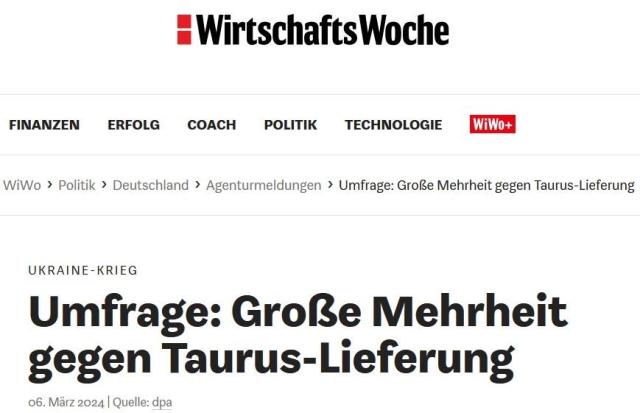
“Poll: Large majority against the supplies of Taurus” to Ukraine, reports the German “Wirtschaftswoche” (Headline screenshot)
The poll unequivocally shows the deep divide between the general public and the political and media elites. There is overwhelming support in the Bundestag for the Taurus delivery, and the relentless propaganda in the mainstream media supports this approach. But the general public mood is clearly against this course of war.
More takeaways from the astonishing conversation between the German generals
What we have also learned in the present case is that German and other Western elites are amateurs and dangerous arsonists, unlike the more professional Russian leadership and China’s meritocratic system, which I have described in detail here. A formal Western democracy in which citizens can elect heads of state and other political leaders who disregard their constituents is not necessarily better than systems in which there may be fewer formal popular votes but in which leaders seek to govern in the interests of the majority. As a Chinese once said: “A system that allows you to call the president an asshole isn’t better than a system that doesn’t allow assholes to become president….”
Moreover, Western political arsonists ignore the fact that increasingly violent NATO aggression could at some point provoke a deadly reaction from Russia. However, European leaders have little understanding of the colossal risks they are taking and NATO officers have lost the discipline they once had during the Cold War to maintain privacy and uphold the security of their respective countries.
They also admit that the Taurus missiles would not change the course of the war and that the Russians could get by without this bridge. This didn’t bother them, yet they are still obsessed with it. As the Russians have begun building overland road and rail links to replace the bridge, it is no longer as important logistically for the military as it was at the beginning of the special military operation. The destruction of the bridge in the first year of the operation would have caused considerable damage to the Russian military. Destroying the bridge now would no longer make military sense.
Why take these astonishing risks for nothing if the war is going to be lost anyway? When senior NATO officers, instead of coolly analyzing the pros and cons, become emotional and obsessed, feverishly advocating for the removal of a civilian infrastructure project that has symbolic rather than military significance, it reveals something else about NATO: its competence (or glaring lack thereof). Nevertheless, it is possible that Ukraine will get its 50 to 100 Taurus missiles at some point (the protagonists of all major German parties, with the exception of the German Chancellor, are calling for this) and that attacks on the bridge will be carried out with Taurus missiles.
We can only hope that the opponents from Russia (and China) keep calm and pursue a sensible political and military strategy without going overboard. That is also the wiser path to success…
▪ ▪ ▪
Related articles:
- No Business is like Political Show Business: The German Foreign Minister narrowly “escapes” from a Russian drone on the Ukrainian war front in designer clothes and high heels.
- The next German ruling party, led by a former BlackRock manager, has just declared war on Moscow and is stirring up anti-Russian sentiment, just as its predecessors did eighty years ago.
- Berlin’s global woke offensive conceals Germany’s self-inflicted decline
- Inconvenient Truths About NATO That Their Mainstream Media Partners Don’t Want You To Know.
- Are Russians the New Jews?
- World Bank: Russia overtakes Germany. As a reminder, last year Germany called for Russia to be ruined. It is only bringing itself down.
- Book your fondest memories here: Enjoy your next vacation in amazing Ukraine!
- Where does the Russian fear of Western aggressors come from?

